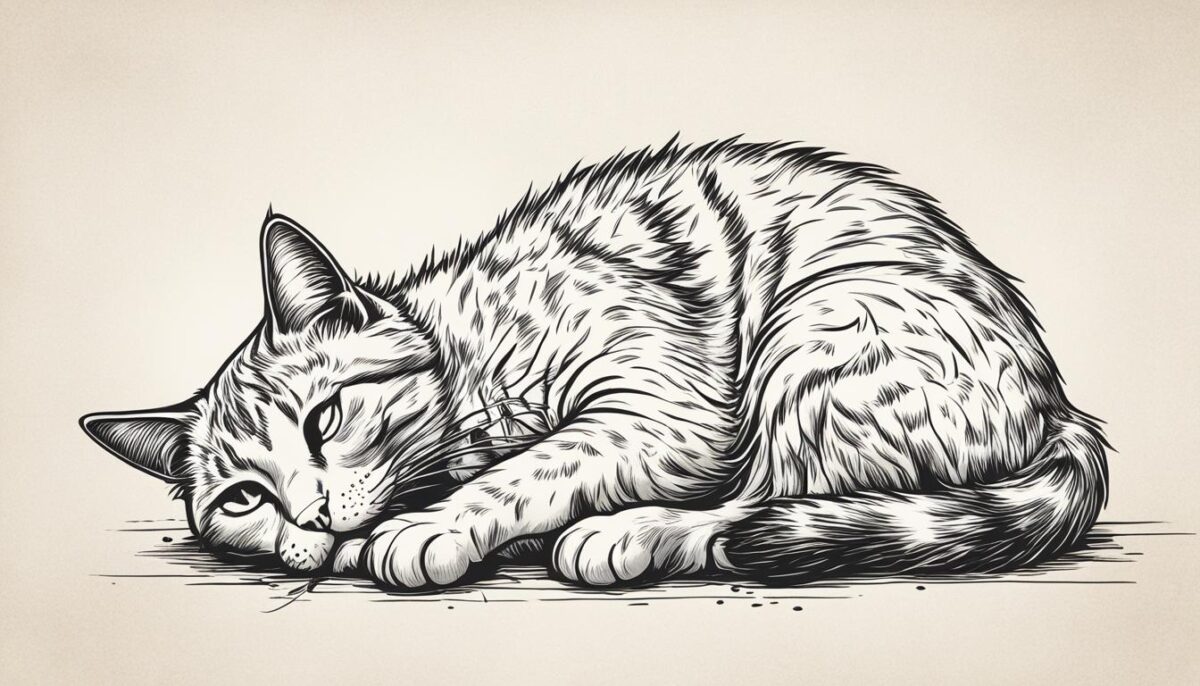If you love your indoor cat, you look after its health every day. But did you know even cats that stay inside can get worms? It’s true! Taking care of your cat means knowing about these pesky feline parasites.
Even though your cat doesn’t go outside, worms can sneak in and make it sick. You can help your furry friend stay healthy by learning about preventing worm infestations. It’s a big part of indoor feline care.
Key Takeaways
- Indoor cats can get worms, so it’s important to know the risks.
- Learning about feline parasites is part of caring for your cat.
- You can help prevent worm infestations with the right knowledge.
- Indoor feline care includes watching for signs of worms.
- Keep learning to keep your cat healthy and happy.
Understanding How Indoor Cats Are Exposed to Worms
Have you ever wondered if your indoor cat could get worms? It might surprise you to learn that even though they stay inside, they can still run into these yucky parasites. Let’s explore how this happens and what you can do to keep your furry friend safe.
Common Parasites in Household Pests
Those little bugs and rodents that sometimes find their way into your house can be more than just a nuisance. Believe it or not, they might carry worm eggs. If your cat enjoys hunting these household pests, there’s a chance they could end up with parasite exposure.
Risks from Coming and Going Family Members
You and your family come and go from the house pretty often, right? Sometimes, without even knowing it, you could bring in worm eggs on your shoes and clothes. One way to help stop this is by keeping a mat at the door to wipe your feet, which is a step for cross-contamination prevention.
Cross-Contamination Between Pets
If you have more than one pet, like a dog or an outdoor cat, they might share more than just your love – they could share worms too! They can pass worm eggs back and forth when they use the same litter box or clean each other. It’s important to keep their spaces clean to help stop the spread of these germs.
Remember, keeping your cat safe from worms is all about paying close attention to the little things. Watch out for pests, clean up well when you come inside, and keep your pets’ stuff nice and tidy. By doing these simple things, you’ll be a super pet parent!
Recognizing the Types of Worms That Infect Cats
Knowing about the bad guys, the worms that can live in your kitty’s tummy, is really important. Let’s find out who they are and what they do, so you can help keep your cat happy and healthy!
Roundworms: The Spaghetti-Like Parasites
First up are roundworms. They are long and skinny, looking a lot like noodles or spaghetti. Cats can get them by eating something that has roundworm eggs, like a tiny bug or even poop from another animal. It’s pretty gross, but it happens.
Tapeworms and Their Rice-Like Segments
Then there are tapeworms. Have you ever seen little bits that look like rice near where your cat sleeps or in their poop? That might be bits of tapeworm. Yuck! These guys hook onto the inside of your kitty’s belly. Cats usually get them from fleas that carry the worm eggs.
The Threat of Hookworms: Small but Harmful
Last are hookworms. Don’t let their size fool you; even though they are tiny, they are mighty mean. They can bite onto your cat’s insides and cause them to lose weight and feel really weak. Cats can pick up hookworms from the ground, especially if they walk on soil or sand where other infected animals have been.
These parasites in cats are not friends, and it’s best to make sure your furry pal stays away from them. With a little care, you can help your cat stay worm-free!
Can Indoor Cats Get Worms? Breaking Down Misconceptions
Hey there! Let’s talk about our furry friends who stay indoors. Some folks might think that indoors means safe from the pesky critters like worms, but this isn’t always true. Our cuddly indoor cats can indeed face parasite risks just like their outdoor pals. It’s super important to know about understanding cat health to keep our kitties happy and healthy.
Here’s the scoop: there are some indoor cat misconceptions floating around out there. One big myth is that our indoor kitties can’t get worms because they don’t go outside. But guess what? Worms can sneak into your home without you even knowing it. They cling onto our shoes or hitch a ride on other pets who do go outside. Even little bugs that scurry into our homes can carry them.
Prevention is just as key for indoor cats as it is for outdoor ones. Keeping your house clean and tidying up your pet’s eating and bathroom spots are good steps to take. For a more specific game plan, your vet can help guide you on safe treatments and routine checkups that keep worms away from your purring pal.
“It’s vital we understand that being indoors doesn’t mean our cats are immune to health risks. As responsible pet owners, we need to be proactive in our approach to their health care.” – Vet Advice on Indoor Cat Care
- Regular vet visits for your cat
- Keep your home clean, especially where your cat eats and sleeps
- Always wash your hands after playing with your cat
Remember, a happy cat is a healthy cat. By understanding the truths behind indoor cat misconceptions and being mindful of the parasite risks, you’re on track to understanding your indoor cat’s health. Don’t delay, start those good habits today!
The Symptoms of Worm Infestations in Felines
Would you know if your furry friend had worms? Recognizing infestations can be tough, but looking out for certain signs of worms in cats is key. These little critters can cause big problems for your cat’s health, and spotting them early is important.
Physical Signs: From Diarrhoea to Pot-Bellied Appearance
One of the first things you might notice is a change in how your cat looks and feels. A swollen belly can mean worms are inside, taking nutrients away from your cat. Other signs, like their coat getting dull and patchy or finding worms in their stool, are red flags too.
Behavioral Changes: Lethargy and Irritability
If your cat starts acting tired all the time or seems grumpy, it could be because they’re not feeling well from worms. They might not want to play as much and could even start having a harder time using the litter box.
When to Consult Your Veterinarian
If you see any of these signs, it’s time to talk to a vet. They can check your cat’s health and give medicine if there are worms. Remember, catching worms early helps your cat stay happy and healthy!
| Signs of Worms | Physical Changes | Behavioral Signs |
|---|---|---|
| Swollen Belly | Patchy Fur | Lethargy |
| Weight Loss | Poor Coat Quality | Irritability |
| Visible Worms in Stool | Vomiting | Change in Appetite |
Effective Worm Prevention and Treatment Options
Keeping your cat happy and healthy means you need to know about worm prevention in cats. These bad little worms can make your kitty feel sick! But don’t worry; there are simple steps you can take, like deworming treatments and maintaining a clean environment, to keep those worms away.
Regular Deworming: A Key to Preventive Care
Did you know that giving medicine to your cat before they get sick can stop worms in their tracks? That’s called regular deworming, and it’s a super-important part of keeping your furry friend worm-free! Your vet can tell you how often your cat needs this medicine.
Topical Solutions and Oral Medications
Sometimes, cats can still get worms, even if we’re super careful. If that happens, your vet has some neat treatments in the form of creams you put on their skin or pills they can eat. These treatments kick those nasty worms out, so your cat feels better fast.
Environment Cleanliness: Litter Boxes and Bedding
Keeping your house clean, especially where your cat eats, sleeps, and uses the bathroom, is another great way to stop worms. Cleaning their litter box and where they sleep keeps those pesky worms away!
| Type of Worm | How to Prevent | Signs of Infection | How to Treat |
|---|---|---|---|
| Roundworms | Regular deworming | Pot-bellied appearance | Oral medications |
| Hookworms | Clean environment | Weight loss | Oral medications |
| Tapeworms | Avoid fleas | Rice-like segments near bottom | Oral medications or injections |
Remember, always talk to your vet before giving your cat any new medicine, to make sure it’s the right fit for them. With these tips and your vet’s help, you can keep your cat healthy and worm-free!
Final Thoughts on Caring for Your Indoor Cat
Keeping your indoor cat happy and healthy means making sure they live a life free from pesky parasites. Even though your cat doesn’t explore the great outdoors, worms can still be a concern. By learning what to watch for and how to prevent problems, you’re already on the path to providing the best care for your furry friend.
Summarizing feline health is all about knowing your cat inside and out. If you spot them being less playful, eating less, or having trouble with using the litter box, these could be signs of worms. It’s like piecing together a puzzle – each little clue can tell you something important about your cat’s health.
Making sure your cat lives a parasite-free life is not tricky. It’s like brushing your teeth – do it regularly, and it becomes a part of your routine. Simple steps like keeping their litter box clean, routine vet checkups, and using the right medications can keep those unwanted guests away.
- Indoor cats are safer, but not immune to worms.
- A clean home and regular vet visits are your cat’s best shield.
- Keep an eye out for signs of worms, and act fast if you see them.
By sticking to these tips, you’re setting up your cat for a cozy, comfortable, and safe life at home. And that’s what every cat owner wants, right? To see their purring pal living their best life, free from worries and full of fun!
Meeting the Author
Hi there! Let’s talk about the writer who brought you all the helpful tips on keeping your indoor cat happy and healthy. This writer is not just someone who loves words and writing; they are a professional copywriting journalist with a special interest in our furry friends’ well-being. With years of experience researching and sharing knowledge, they offer expert insights on cat health that can help you take great care of your pet.
Writing is not just about putting words together; it’s also about understanding what you, the reader, need to know. That’s why this author spends time learning from vets and other cat experts, so they can share with you not just any information, but the right advice to help your indoor cats live free of worms and other health troubles.
Whether you’ve been a cat owner for years or just welcomed a new kitten into your home, this author’s aim is to make sure you have all the easy-to-read info you need. That’s what being about the writer means here – always being on your side and helping you care for your cuddly companions.
FAQ
Can indoor cats really get worms?
Yes, even if your cat stays inside, they can get worms. Indoor cats might hunt rodents or insects that carry worm eggs, or worm eggs can be brought into the house inadvertently by people or other pets.
What are the common ways indoor cats are exposed to worms?
Indoor cats are usually exposed to worms through household pests like rodents and insects, from other pets in the home, and from family members who may accidentally bring in worm eggs on their shoes or clothes.
What types of worms typically infect cats?
The most common types of worms that infect cats are roundworms, tapeworms, and hookworms. Each one has different characteristics and can cause various health problems for your feline friend.
What are the misconceptions about indoor cats and worms?
A common misconception is that indoor cats don’t need to worry about worms. This isn’t true as indoor cats can, and do, get worms, which is why preventive care is important for all cats, regardless of whether they go outdoors.
How can I tell if my indoor cat has worms?
Symptoms of a worm infestation can include vomiting, diarrhea, a pot-bellied appearance, weight loss, dull fur, and changes in behavior such as lethargy. If you notice these signs, consult your veterinarian for advice and treatment.
What can I do to prevent my indoor cat from getting worms?
You can prevent worms in indoor cats by providing regular deworming treatments, keeping the living environment clean, especially litter boxes, and getting vet-prescribed topical solutions and oral medications as preventative measures.
Are there any additional measures I should take if I have both dogs and cats at home?
Yes, since pets can cross-contaminate each other, ensure that all your pets are regularly dewormed. Also, separate the pets’ litter boxes and sleeping areas, and clean them regularly to minimize the risk of any parasite exposure.
How often should I deworm my indoor cat?
The frequency of deworming can vary based on your cat’s lifestyle and health. It’s best to follow a veterinarian’s advice, but typically, it’s recommended to deworm once every three months as a preventive measure. However, kittens and cats with known exposure may need more frequent treatments.
What should I do if I suspect my cat has worms?
If you think your cat may have worms, schedule a vet appointment for a diagnosis. Your vet can confirm the presence of worms through fecal exams and recommend appropriate treatment options.
Can worm infestations in cats lead to serious health issues?
Yes, if left untreated, worm infestations can lead to serious health issues such as malnutrition, anemia, gastrointestinal blockages, and in severe cases, can be life-threatening. Prevention and early treatment are key to avoiding these complications.


